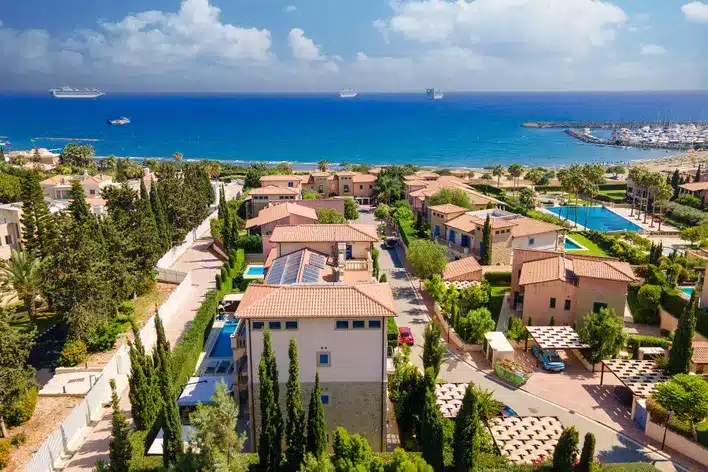How to Finance Your Cyprus Property Purchase: Mortgage Options Explained
Buying a home on the island is exciting, yet the money side can feel opaque if you’re new to local rules. This guide walks you through Cyprus mortgage types, typical lending limits and rates, fees you’ll meet on the way to the Land Registry, and the paperwork lenders want. Figures are current to early–mid 2025, with sources noted for clarity.
1. How Cypriot Mortgages Work
Banks in Cyprus usually lend a percentage of the property value, not the full price you’ve agreed with the seller. The Central Bank caps loan‑to‑value (LTV) at about 80% for a main home and 70% for other purchases. Recent average mortgage rates sit around 3.8%–4.6% per annum, depending on term and whether the rate tracks Euribor or is fixed for a period.
Foreign buyers can still borrow, though some banks limit products to residents or ask for higher deposits. Age caps (often 65 at loan maturity) and maximum terms up to 30–40 years are common.
Cyprus lenders will expect proof of income, bank statements, tax returns and a clean credit history. Independent legal advice is standard practice. Into this context, many buyers hunting apartments for sale Limassol find pre‑approval helps when negotiating.
2. Fixed, Floating and Mixed Rates
Products mirror European norms:
- Fixed rate for an initial window (e.g. 3, 5, 10 years).
- Pure floating tied to 3‑month Euribor plus a spread.
- Combination loans that start fixed then switch to floating.
- Fixed rates advertised “from 2.80%” are entry points; the actual rate reflects LTV, amount and term. Floating spreads start near 2% above Euribor.
When comparing offers, check arrangement fees, early repayment charges and any compulsory insurance. A mortgage broker or independent adviser can benchmark quotes across banks. Buyers comparing flats for sale Limassol should add these costs to their spreadsheet so the “cheapest” rate on paper doesn’t cost more overall.
3. Fees and Taxes Beyond the Loan
Cyprus applies VAT of 19% on new builds, with a reduced 5% rate for an eligible primary residence. Law changes in 2023 kept the 5% but tightened criteria; confirm you still qualify.
Transfer fees are due only on resales and are halved (50% reduction) when VAT is not charged. No transfer fee is payable if VAT was paid on the purchase.
Stamp duty ranges roughly 0.15%–0.2%, and you’ll also budget for legal, survey and Land Registry charges.
These numbers help set a realistic deposit target, especially if you’re comparing apartments for sale in limassol cyprus and trying to keep cash in reserve for furnishing or renovation.
4. Title Deeds and Bank Requirements
Title deeds matter for financing. Recent legislation (Law 132(I)/2023) obliges sellers to provide a five‑day Land Registry search showing any encumbrances. Banks usually won’t release funds until deeds are clear or a legal mechanism protects the lender.
If buying off‑plan or a new build where deeds are pending, ensure your lawyer structures the contract so payments are tied to construction milestones and bank approval. This protects you if the developer delays. That extra diligence pays off when scouting apartments to buy in Limassol, where new coastal projects can carry staged completion schedules.
5. Getting Ready: A Quick Checklist
Before you apply:
- Calculate deposit and fees (VAT/transfer/stamp/legal).
- Gather payslips, tax returns, bank statements (usually last 6–12 months).
- Obtain a recent credit report.
- Instruct an independent lawyer (not the developer’s).
- Order a valuation/survey acceptable to your chosen bank.
- Check the property’s Title Deed or the legal workaround if deeds are pending.
Ticking these off early speeds underwriting, which matters when you’re ready to buy apartment Limassol and want to lock in a rate offer before the market shifts.
6. Non‑Residents and Expats
Non‑residents can borrow, though fewer banks cater to them. Where available, expect lower LTVs (near 70%), more paperwork (translated, notarised documents) and possibly life or property insurance assigned to the bank.
Some lenders cap loan sizes or demand proof of ties to Cyprus (regular visits, local bank account). If you plan to rent the property, disclose this; residential mortgage terms can differ from buy‑to‑let products. These nuances often surface while comparing a 2 bedroom apartment for sale Limassol with a smaller place you plan to use seasonally.
7. Alternatives: Developer Finance, Equity Release and Cash Top‑Ups
If bank lending doesn’t fit, developers sometimes offer staged payment plans, though interest and security terms vary and need legal review. Equity release on property you own elsewhere or personal loans in your home country can fill gaps, but currency risk rises if repayments aren’t in euros.
Cypriot banks may allow top‑up loans secured on an existing property once deeds are issued. Always compare the true cost against renegotiating your main mortgage. Thoughtful structuring is just as vital when eyeing a 1 bedroom apartment for sale Limassol as it is for a villa.
Final Steps to Completion
Once the bank issues the formal offer, you sign loan documents, pay stamp duty on the mortgage, and the lender registers its charge. On completion day, funds move, the Land Registry updates the deed (or relevant contract of sale), and you start repayments. Keep all receipts and confirmations; you’ll need them for future tax questions or a resale.
With solid preparation, financing a Cyprus property becomes a structured process, not a leap into the unknown. Pick the right loan, verify the fees, and work with professionals who know the system. That way your new address in Limassol comes with peace of mind as well as sea views.




